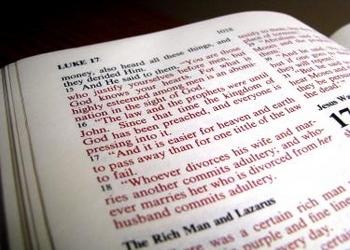Does Luke 16
16 Mean God's Law Has Been Done Away?

What is the meaning of Luke 16:16?
Some people who believe that we don’t need to keep God’s law, or God's Sabbath or Holy Days today, cite Luke 16:16: "The law and the prophets were until John. Since that time the kingdom of God has been preached, and everyone is pressing into it."
Is Jesus saying in this verse that God’s law was required to be kept and the prophets respected until John the Baptist, but now the law has perished or failed, and is no longer necessary to keep?
Is Jesus saying also, that we no longer even need to respect or abide by the teachings of the prophets of God who came before John the Baptist?
The very next verse contains the spoken words of Jesus Christ, which show very clearly that the law of God is not done away with. The law of God is consistent and will always be.
“And it is easier for heaven and earth to pass away than for one tittle of the law to fail” (Luke 16:17).
Have the starry heavens or the planet earth passed away?
Jesus said it would be easier for them to perish or be destroyed than even for one tiny part of God’s law to pass away or to perish.
Just before Luke 16:16, Jesus quotes the Tenth Commandment and corrects the Pharisees for their covetousness.
After Luke 16:16 Jesus quotes the Seventh Commandment and gives detailed instruction about not committing adultery.
Hardly, doing away with God’s law, wouldn’t you say?
On another occasion mentioned in Matthew 19:17 Jesus told a young man, seeking the way to eternal life, “If you will enter into life, keep the commandments.”
How clear it is that God’s holy law is still in existence.
So what can we learn from Luke 16:16? What is the message Christ is delivering? What did Jesus mean by the statement, “The law and the prophets were until John”?
When Jesus spoke of the “law and the prophets”, He was referring to the Old Testament. The first five books of the Bible, written by Moses, are known as the law; the books of Joshua through Kings, Isaiah, Jeremiah, Ezekiel and the 12 minor prophets comprise the “prophets.” The third major section of the Old Testament was known as the “writings” or “psalms.” Notice Luke 24:27-45.
Jesus was simply stating a fact, that the Old Testament scriptures alone were preached until the coming of John the Baptist. They were the only writings and information that they had. The New Testament had not been written yet.
When John came on the scene, he was the forerunner of Jesus Christ, preparing the way before Him, the “voice crying in the wilderness” (Mark 1:2-8).
John had to deal with the Pharisees, just as Christ was dealing with them, here in these verses surrounding Luke 16:16.
John thundered to the Pharisees, the Sadducees and all of the people of his day, “Repent, for the kingdom of heaven is at hand” (Matthew 3:2).
John began to proclaim the gospel (good news), preparing the way for Christ Himself. But, what gospel and what good news did Christ preach?
"Now after John was put in prison, Jesus came to Galilee, preaching the gospel of the kingdom of God, and saying, “The time is fulfilled, and the kingdom of God is at hand. Repent, and believe in the gospel” (Mark 1:14-15).
So, we see plainly, that Jesus Christ preached the same gospel that John did.
This is why Jesus said in Luke 16:16 that from the time of John the Baptist, the good news of God’s coming Kingdom or Government on this earth, was being proclaimed.
Jesus spoke later in Luke 16 of the importance of following God’s inspired Word and laws in the Bible: “But he said to him, 'If they do not hear Moses and the prophets, neither will they be persuaded though one rise from the dead'" (Luke 16:31).
Do we heed these words of Jesus today, or are we dead of hearing like the Pharisees?
Do we heed the words of Moses and the prophets and live God’s Way of life now in this life? Do we seek to develop the character and mind of Jesus (Philippians 2:5)? Do we lovingly keep God’s commandments (1 John 5:3) as we prepare now to be in Christ’s Government of God on this earth?
